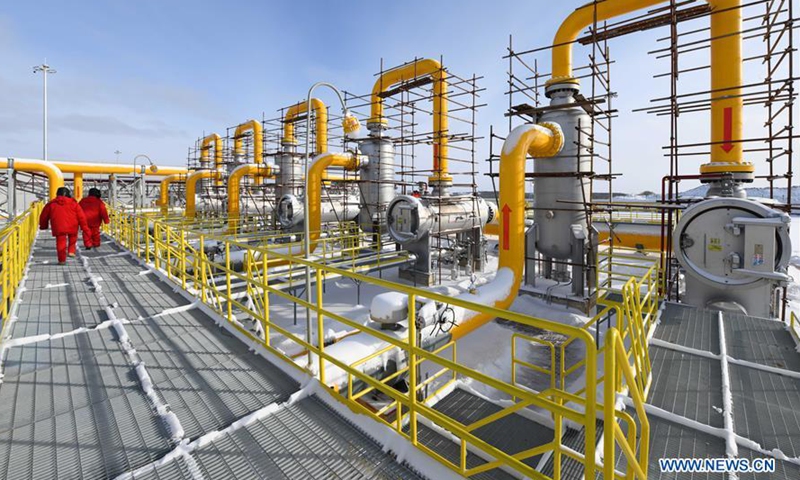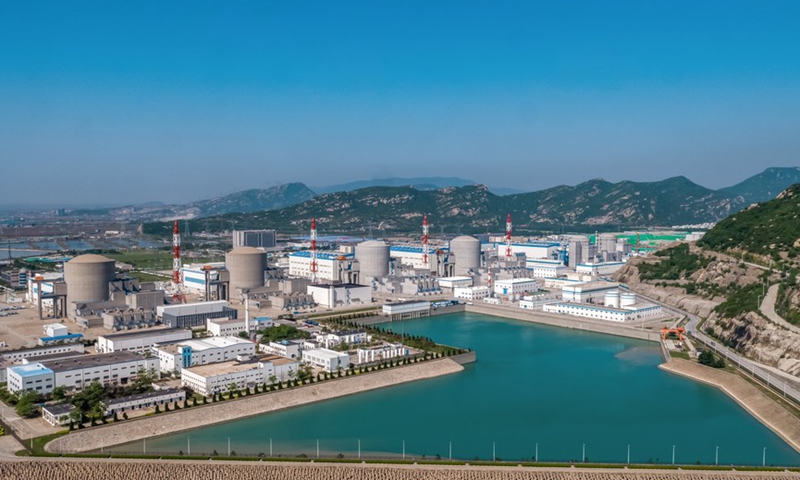
Staff members inspect the gas-distributing and compressing station of the China-Russia east-route natural gas pipeline in the city of Heihe, the first stop after the Russia-supplied natural gas enters China, northeast China's Heilongjiang Province, Nov. 19, 2019.Photo:Xinhua
Closer energy cooperation between China and Russia was a major focus for the top leaders of the two countries who met Friday in Beijing, just ahead of the opening ceremony of the 2022 Beijing Winter Olympics.
Valuing Russia as a reliable source of energy for China, observers say the partnership between the two will enhance sustainability of global supply chains.
China has plans to strengthen energy strategic cooperation with Russia, push for mega oil and gas projects, accelerate major tech innovations in energy, explore new energy partnerships and support each other's efforts to safeguard energy security, read a Chinese statement after the high-profile meeting between President Xi Jinping and his Russian counterpart Vladimir Putin on Friday in Beijing.
Chinese and Russian government officials signed an array of agreements of cooperation on major areas, said the statement, without elaborating.
"Those deals might cover energy, which is already an area of close cooperation between oil and gas exporter Russia and the world's top energy consumer China," said a report by the Reuters.
"The statement by the top leaders of the two countries sets the tone for future cooperation on energy," Liu Qian, executive deputy director, from Center for Russian and Central Asian Studies with China University of Petroleum (Beijing) told the Global Times on Friday. He added that the two countries are actively conducting energy technology cooperation in recent years.
The two nations have a lot of room for cooperation in LNG production and energy infrastructure build-up, Liu said, explaining that Russia faces some challenges in energy sector transformation and modernization.

Aerial photo taken on May 17, 2021 shows an overview of the Tianwan nuclear power plant in Lianyungang City, east China's Jiangsu Province.Photo:Xinhua
As to future energy corporation, Liu said it's envisioned to include the China-Russia east route, Arctic LNG 2 project, and the Tianwan and Xudabao nuclear power plants.
On Friday, Russia's state-owned energy giant Gazprom announced it had signed a long-term agreement with its main Chinese partner China National Petroleum Corporation (CNPC) to supply natural gas to China via the Far Eastern route.
"As soon as the project reaches its full capacity, the amount of Russian pipeline gas supplies to China is going to grow by 10 billion cubic meters, totaling 48 billion cubic meters per year (including deliveries via the Power of Siberia gas trunkline)," according to a statement on Gazprom's official website.
"This is already a second contract to be signed for Russian gas supplies to China, and it is indicative of the exceptionally strong mutual trust and partnership between our countries and companies," said the statement, citing Chairman of the Gazprom Management Committee Alexey Miller.
"Our Chinese partners from CNPC have already seen for themselves that Gazprom is a reliable gas supplier," according to Miller.
China's trade volume with Russia topped $140 billion for the first time in 2021 as China held onto its position as Russia's top trading partner for the 12th year in a row.
China's exports to Russia jumped 33.8 percent year-on-year to $67.57 billion last year, while its imports from Russia, a bulk of which was oil and gas, rose 37.5 percent to $79.32 billion, Chinese customs data showed.
In a signed article carried by Xinhua News Agency on Thursday, Putin said that "a mutually beneficial energy partnership is being formed" between China and Russia. "Along with long-term oil and gas supplies to China, we have plans to implement a number of large-scale joint projects."
"The construction of four new power units at Chinese nuclear power plants with the participation of Rosatom State Corporation launched last year is one of them. All this significantly strengthens the energy security of China and the Asia region as a whole," Putin said.
Market insiders said two countries, China, the largest energy importer, and Russia, the largest energy exporter, are displaying a growing interdependence on energy cooperation.
Whether in terms of geopolitics or the complementarities of resources and markets, closer partnership of Moscow and Beijing are mutually beneficial and win-win, Lin Boqiang, director of the China Center for Energy Economics Research at Xiamen University, told the Global Times on Friday.





